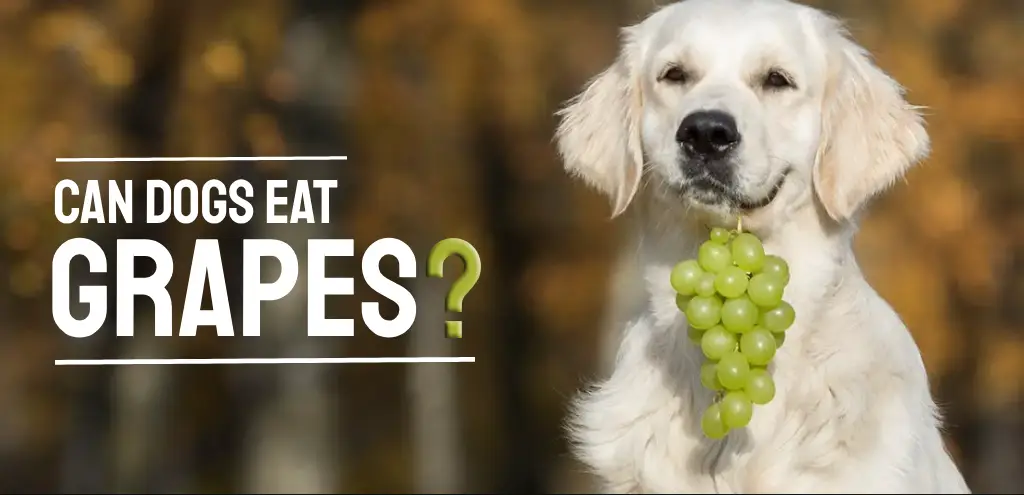When it comes to feeding our furry friends, it’s essential to be cautious about the foods we offer them. While some human foods are safe for dogs, others can be harmful and even potentially fatal.

One such food that often raises concerns is grapes. In this article, we will explore the question, “Can dogs eat grapes?” We will delve into the risks of kidney failure associated with grape consumption in dogs and discuss the importance of pet insurance in safeguarding our furry companions’ health and well-being.
Can Dogs Eat Grapes? Exploring the Risk of Kidney Failure
Understanding the Danger: Toxins in Grapes
Grapes, along with raisins, belong to the fruit family and are often enjoyed by humans as a tasty and healthy snack. However, grapes pose a significant threat to our canine friends. The exact compound responsible for the toxicity is yet to be identified, but it is believed to be present in both seeded and seedless varieties of grapes.
The Link Between Grapes and Kidney Failure
Feeding grapes to dogs can have severe consequences, with kidney failure being the most common and dangerous outcome. Kidneys play a vital role in filtering waste products and maintaining proper hydration in dogs.
The toxins present in grapes can lead to irreversible damage to these vital organs, leading to kidney failure. It’s important to note that even a small number of grapes can pose a risk, and the severity of the symptoms can vary from one dog to another.
Symptoms of Grape Toxicity in Dogs
Identifying the symptoms of grape toxicity is crucial for early detection and prompt treatment. The signs can manifest within hours or up to a couple of days after ingestion. Some common symptoms include:
- Vomiting
- Diarrhea
- Loss of appetite
- Lethargy
- Abdominal pain
- Decreased urination
If you suspect that your dog has consumed grapes or is showing any of these symptoms, it’s essential to seek veterinary care immediately.
Treatment for Grape Toxicity
When it comes to grape toxicity, time is of the essence. If your dog has ingested grapes, prompt action can make a significant difference in their outcome. Upon seeking veterinary care, your veterinarian may induce vomiting to remove any remaining grapes from the stomach.
Activated charcoal may also be administered to absorb any toxins present in the digestive system. Intravenous fluid therapy is crucial to flush out the toxins from the kidneys and prevent dehydration.
Importance of Pet Insurance for Grape Toxicity
Grape toxicity and the resulting kidney failure can lead to substantial medical expenses. In severe cases, hospitalization and intensive care may be required, further adding to the financial burden. This is where pet insurance plays a crucial role in mitigating the costs associated with treating grape toxicity and other health issues.
FAQs About Dogs Eating Grapes and Kidney Failure
1. Can a single grape cause kidney failure in a dog?
Yes, even a single grape can pose a risk of kidney failure in dogs. The toxic compounds present in grapes affect each dog differently, and the severity of the reaction can vary. It’s best to avoid feeding grapes to your dog altogether.
2. What should I do if my dog eats grapes?
If your dog consumes grapes, it’s important to act quickly. Contact your veterinarian immediately and provide them with details of the ingestion. They will guide you on the necessary steps to induce vomiting and seek appropriate treatment.
3. Are all dogs equally susceptible to grape toxicity?
While grape toxicity can affect dogs of any breed or age, some dogs may be more susceptible than others. However, it is difficult to predict which dogs will have an adverse reaction to grapes. As the toxic compound is still unknown, it’s safer to assume that all dogs can be affected.
4. Are there any safe alternatives to grapes for dogs?
Yes, there are several safe and healthy alternatives to grapes that dogs can enjoy. Some popular options include apples, blueberries, and watermelon. Always remember to remove seeds and pits, as they can be hazardous to dogs.
5. Can grape toxicity be prevented?
The best way to prevent grape toxicity is by ensuring that your dog does not have access to grapes or any products containing grapes. Educate your family members and visitors about the dangers of grapes for dogs to maintain a grape-free environment for your furry friend.
6. Is pet insurance worth it for grape toxicity and other health issues?
Absolutely! Pet insurance provides peace of mind by helping to cover unexpected medical expenses, including those associated with grape toxicity. By investing in a comprehensive pet insurance plan, you can ensure that your dog receives the necessary treatment without putting a strain on your finances.
Conclusion
In conclusion, it is crucial to remember that dogs should not eat grapes due to the risk of kidney failure and other severe health complications. The exact toxic compound in grapes is still unidentified, making it difficult to determine a safe threshold for consumption. The best course of action is to prevent dogs from accessing grapes altogether. In the event of grape ingestion or any signs of grape toxicity, immediate veterinary care is essential.
Pet insurance is highly recommended to safeguard your furry friend’s health and well-being. It provides financial protection, ensuring that you can provide the necessary treatment without hesitation. Protect your dog from the risks associated with grape toxicity and other health issues by investing in a reliable pet insurance policy today.


